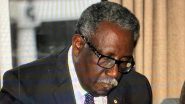Guatemala City, Jun 26 (AP) Preliminary results in Guatemala's presidential election pointed to the likelihood of a second round of voting and narrowed the field considerably early on Monday from nearly two dozen contenders to the two candidates from opposite ends of the political spectrum leading for spots in the August 20 runoff.
With 98 per cent of the votes counted early on Monday, the Supreme Electoral Tribunal reported that former first lady Sandra Torres for the conservative UNE party had captured 15.7 per cent of the vote and Bernardo Arévalo for the leftist Seed Movement had 11.8 per cent. In a more distant third, was Miguel Conde of the ruling VAMOS party with 7.8 per cent.
Also Read | Indian Passengers Stranded at Paris Airport After Air France Cancels Connecting Flight to Toronto.
That is far from the 50 per cent threshold needed to win in the first round. A cluster of other candidates hovered between 6 per cent and 7 per cent of the votes. Invalid ballots from a frustrated electorate led all the candidates with nearly all ballots tallied.
Gabriel Aguilera, a magistrate on the Supreme Electoral Tribunal, said before dawn Monday that while not definitive, the trend showed that “we have three parties leading.” The tribunal scheduled another news conference for later Monday morning.
Also Read | South Korea To Create USD 230 Million Fund for Chip Industry.
Torres, watching the results from a downtown hotel conference room, told reporters that regardless of her opponent, she was ready for the runoff and “God willing, to be Guatemala's first woman president”. She recognised the high number of invalid ballots and said it indicated the citizens' lack of confidence in the process.
But the real surprise was the Seed Movement, whose candidate Arévalo conceded the early returns surprised him too. At the central voting computation centre, Arevalo said he would take the faith that voters showed in him on Sunday and use it “to pull the country out of the swamp” if elected.
“The results are the exhaustion of the people with the traditional political class,” Arevalo said.
The vote came amid Guatemala's worrisome drift toward authoritarianism. Voters worried about security, education and jobs hoped that even if the next president didn't represent the change element they hoped for, he or she would at least recognize the importance of the country's institutions and halt the erosion that occurred under President Alejandro Giammattei.
In four years, Guatemala went from an aggressive pursuit of networks of corrupt actors to a relentless persecution of the very prosecutors and judges who propelled it. More than two dozen justice figures have fled the country.
With them in exile, the government then turned its sights to other critical voices, including the media. Earlier this month, a tribunal sentenced newspaper founder José Rubén Zamora to six years in prison for money laundering, in what press freedom groups decried as Giammattei silencing a prominent critic.
As the presidential campaign got underway earlier this year, electoral authorities and courts kept three prominent candidates — from the left and right, but all promising to disrupt the status quo — off the ballot.
Barred from participating, they called for their supporters to cast null ballots.
“It's the democratic way of rejecting the system,” said Roberto Arzú, who briefly ran a conservative law-and-order campaign before authorities ruled him ineligible for allegedly starting his campaign prematurely.
Other popular excluded candidates were leftist Thelma Cabrera from the Indigenous Mam people and Carlos Pineda, a conservative populist running an outsider campaign and leading in the polls until his candidacy was cancelled a month before the vote.
The stronger-than-expected showing by the Seed Movement — a leftist party whose presidential candidate Arévalo hadn't been among leading candidates in the most recent polls — was the perhaps the biggest shock. Arévalo is the son of Juan José Arévalo, one of only two leftist presidents in Guatemala's democratic era.
In 2019, Arévalo won a seat in the congress for the Seed Movement, which he had founded. He had previously been a career diplomat, serving as Guatemala's ambassador to Spain and a deputy foreign affairs minister in the administration of President Ramiro de León Carpio during the mid-1990s.
Arévalo, 64, is a social democrat and campaigned on social justice, as well as restoring the rule of law and separation of powers.
This is the 67-year-old Torres' third try for presidency. She was first lady during the 2008-2012 presidency of social democrat Álvaro Colom, until they divorced in 2011. Her running mate is a former evangelical preacher and they have pledged to maintain Guatemala's strict anti-abortion law and other policies related to conservative family values. She campaigned on increasing support for the poor and improving security.
More recently, she has been Giammattei's strongest ally in congress, marshalling her party's votes to support him, something that earned her the distrust of many Guatemalans.
Torres was charged with campaign finance crimes in 2019 and jailed. She never went to trial, however, because the Constitutional Court ruled that she couldn't be charged because of a legal reform approved with the support of her party.
Edgar Gutiérrez, a political analyst and former foreign affairs minister for Guatemala, said before the vote that some of those most likely to advance to a second round would promise at least a modicum of improvement over Giammattei.
“This time the problem is to rescue the rule of law and reconstruct institutions, because if we don't do this, you won't be able to address all of the underlying problems,” Gutiérrez said.
The problem isn't isolated to Guatemala in Central America.
Nicaraguan President Daniel Ortega has gone to extremes to quash all opposition, first terrorizing with his security forces, persecuting enemies through targeted legislation, then jailing and exiling any critical voices.
El Salvador's president, Nayib Bukele, is wildly popular at home, but has concentrated power in the congress and judiciary, weakening the system of checks and balances. More than a year after suspending some fundamental rights, the government has jailed more than 60,000 people accused of ties to the country's powerful street gangs.
In Honduras, a prominent government watchdog fled the country with her family this month, weeks after her organization published a report expressing concern that President Xiomara Castro has sprinkled relatives throughout the government in key positions.
“Everything that is happening in Central America is this, a disenchantment in democracy, the discrediting of democratic institutions par excellence,” Gutiérrez said. “So the people because of that are leaving Guatemala. They are emigrating because the democracy does not produce results.” (AP)
(This is an unedited and auto-generated story from Syndicated News feed, LatestLY Staff may not have modified or edited the content body)













 Quickly
Quickly
















